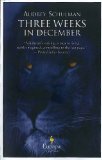Summary | Excerpt | Reviews | Beyond the Book | Readalikes | Genres & Themes | Author Bio

"Five times?" she repeated.
They nodded.
"Also a mild vasodilator," added Roswell.
"Any vine left?" she asked.
"No."
"The crude extract?"
He shifted in his chair. "Tossed. Before the tech read
through the printed results."
She studied the oak outside. It was at least 100 years old.
Earlier in the fall she noted it had a mild case of anthracnose,
the brown blotches spreading across the leaves. With luck, this
winter would be severe enough to kill the fungus. "Any description
of what the vine looked like? The shape of the leaf? The
type of branching?"
"From the tech? He's just out of college, doesn't notice
plants."
Max was derailed for a moment, trying to imagine that.
Then continued, "Foreign or domestic?"
"What?"
"Where'd the vine come from?"
"Virunga National Park, Rwanda."
"Foreign." She eyed the oak. She'd always been honest to a
fault, uncomfortably honest. "Well, I'm sorry then. This won't
work. You won't be able to get the plant out through customs.
Not legally. It's the property of another country."
Stevens responded, his voice smooth. "The Rwandan president
himself has given us the go-ahead, requesting immigration
render us every assistance possible."
She was careful this time to glance only so far as his mouth.
A mouth wasn't as shivery as eyes, not so shocking. His lips
were stretched in a proud smile, indents at the corners of his
mouth from the contraction of the buccinator muscles. However,
none of his teeth were revealed.
"How'd you manage that?" she asked, turning back to the oak.
Plants were so much more understandable. This tree, for instance,
whatever gesture it made was how it grew, its limbs hardening
into its intent. She could comprehend it at a glance, its past
struggles for water and sun, its future needs there in the angle
of its trunk, the reach of its branches. Never a hidden agenda.
The two men looked at each other. Then Roswell said in his
flatter voice, "Since the genocide, the country's not doing so
well economically. They need money."
Stevens continued, "If any drug made it to market, the
Rwandan government would get a share of the profits. Also
we're in preliminary negotiations to build a factory in Kigali."
She glanced over. His smile wider, lips parting, visible teeth.
(Most humans were born able to read the facial expressions
of others - not even knowing they should be thankful for that
immense power. They could afford to be sloppy, satisfied
with approximations of sincerity. Max, on the other hand, had
labored for a solid year before college, studying flashcards and
videos. Her mom and her, on the couch, went frame by frame
through Bambi and Dumbo, analyzing each close-up.
Animated talking animals were much less threatening and had such telegraphed emotions. They became her seminar in humanity. She could reel off every facial muscle. Zygomaticus major, caninus, procerus. She'd memorized action units and rules.)
Stevens's grin wasn't honest, for it didn't extend to the muscles
under his eyes.
Her mother had always repeated that, yes, Max had deficits,
but through them she could attain unusual strengths.
"You're not going to build a factory there, are you?" she
guessed.
A beat passed. His voice wasn't quite as smooth when he
responded. "That hasn't been determined yet. The important
thing, in terms of us getting hold of this vine, is that Rwanda
needs this facility."
Five times the beta-blockers of Carvedilol, she thought. She
noticed her hands were flapping slightly, patting her knees as
though she were keeping time. She consciously stilled them in
her lap. Her whole life spent imitating the normals. "To get
hold of that vine, not just the government has to sign off. The
era is over in which we can make nice with a shaman for a few
days in order to learn priceless botanical secrets. The shamans
are onto us. The tribes have lawyers." No one who didn't know
her well would detect excitement. In the field of science, the
monotone of her voice helped her, sounding dispassionate.
"Harvard's latest expedition is being sued by over fourteen different
indigenous - "
Excerpted from Three Weeks in December by Audrey Schulman. Copyright © 2012 by Audrey Schulman. Excerpted by permission of Europa Editions. All rights reserved. No part of this excerpt may be reproduced or reprinted without permission in writing from the publisher.
Your guide toexceptional books
BookBrowse seeks out and recommends the best in contemporary fiction and nonfiction—books that not only engage and entertain but also deepen our understanding of ourselves and the world around us.